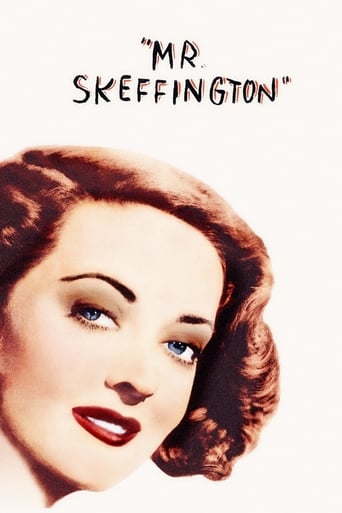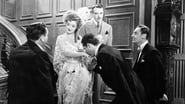Tad Pole
. . . the U.S. War Department Film Censors of the World War Two Era, nor could it survive the Extreme Vetting that Leader Trump's ICE men will be able to do once his tie-breaker U.S. Supreme Court Justice Neil Gorsuch (whom he trumped away from Barack Hussein Obama) overrules all of the latter's lowly so-called judges. MR. SKEVINZSKAVA confesses to American Intelligence Operative "Fanny Trellis" that he's assumed the name of "Skeffington" at 37:40. Bette Davis' "Fanny" then goes undercover (literally) to sleep with this MR. SKEVINZSKAVA (who is later reported to be one of Hitler's U.S. Fifth Columnist Minions), not unlike Ingrid Bergman's fate in NOTORIOUS. Bette goes Ingrid one better, getting knocked up with MR. SKEVINZSKAVA's child. The heroic Bette--then between her own Real Life abortions #5 and #6, according to her Trivia Page on this site--goes through a ROSEMARY'S BABY-type ordeal, in which this DEMONSEED makes her "all puffy and swollen and ugly" (58:30). Soon Bette, just 36 in Real Life, convinces us that she's a 50-year-old Fanny, pushing 97. Sadly, Bette's lizard-faced condition froze on her for the remainder of her career on the Big Screen, illustrating the sort of irreversible damage that can be done to our All-American Gene Pool if Homeland Security allows the MR. SKEVINZSKAVAs of this world to sow their Wild Oats--spreading STD's such as syphilis, gonorrhea, and diphtheria--among our delicate Fanny's.
trajanlvii
This film left me very confused about the directorial effort. The first 3/4 of the film was very engrossing, good writing, good direction, excellent performances. The last 1/4 of the film is a trite, confusing mess...I looked it up online to see if they had changed directors during the filming. It was that bad. I wondered at the time if the actors were aware of how badly the film was drifting. The over the top performance by Davis doesn't work in the later stages of the film. It was impossible for me to feel a great deal of sympathy for her character. I love Claude Rains but he became more of a plot device in the last 1/4 of the film. This movie would have benefited greatly by some decisive cutting in the editorial department.
jarrodmcdonald-1
Critic James Agee, when reviewing the film in 1944, felt it was an overwrought story made to manipulate female moviegoers. Not sure if I agree with his assessment, but I do think Bette Davis is miscast as a gorgeous woman. It would have worked better with someone like Vivien Leigh or Gene Tierney-- any actress whose beauty was obvious and too striking to ignore. Or perhaps someone like Ingrid Bergman would have done an excellent job. And maybe in place of Rains, they could have reunited her with Boyer. Joan Fontaine (in Warners' remake of THE CONSTANT NYMPH a year earlier) might also have been acceptable.But Davis just does not work for me in this role. In NOW, VOYAGER she starts as an ugly duckling and we know that even despite her metamorphosis, she still has all those ugly insecurities inside-- that's sort of what bonds her to the young girl later on in the picture. However, in MR. SKEFFINGTON there is not supposed to be any doubt that she's a confident and alluring woman. I feel what we get here is play-acting, a vainglorious actress in a less- than-noble attempt to play a great screen siren. It's just not believable at all, no matter how much they dress her up.
moonspinner55
Julius J. and Philip G. Epstein co-produced and co-adapted this fetching, moving, often wonderful study of a woman's life, based on the story by "Elizabeth" (née Elizabeth von Arnim). Bette Davis gives a high-wire act of a performance as Fanny Trellis, a flirtatious New Yorker in the early 1900s with no money in the bank, a brother to support, and potential suitors lined up at the foot of her staircase. She eventually marries a Jewish financier whom she doesn't love, but who adores her, yet never tires of her gentleman callers (whom she discards in much the same way as she does everybody else). This vain, frivolous beauty with the goosey good humor eventually gets her comeuppance however, and it's a bittersweet moment. Director Vincent Sherman allows this lengthy tale to unfold at a casual, jaunty pace, though he's exceptionally straightforward with the narrative and doesn't pussyfoot around. We see the years passing via newspaper headlines--a cliché--yet Sherman never loses his focus, and we understand where our non-sensible heroine is coming from emotionally at every exasperating turn. Davis never allows interest to wane in her characterization, and she's matched scene-for-scene by a charmingly low-keyed, non-threatening Claude Rains. Some of the supporting performances are overstated, as is Franz Waxman's hyperkinetic score, but the sheer professionalism of the production and some very funny lines help compensate for the film's minor deficiencies. *** from ****




